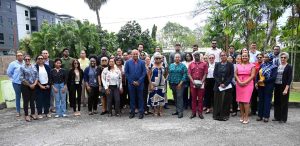By Sue-Ann Wayow
THE Ministry of Finance is reviewing the list of luxury food items imported into the country in order to reduce the local demand for such items.
Minister of Trade and Industry Paula Gopee-Scoon in the Senate on Tuesday said the food import continued to be at a high of approximately $5.7billion annually.

Gopee-Scoon said, “The government recognises the need to prioritise the use of the country’s limited foreign exchange on essential items.”
She made reference to the 2021 Budget that the 12.5% Value Added Tax (VAT) would be applied to a wide range of luxury imported foods with the intention of reducing the high local demand for luxury food and subsequently the demand for foreign exchange.
She said for the period 2018 to 2020, certain food imports were valued at approximately TT$78million annually and included smoked salmon, lobsters, grapes, apples, pears, strawberries, peaches and other fruits.

Gopee-Scoon said, “The key strategies to managing the optimal use of foreign exchange are to pursue import substitution strategies particularly as it relates to reducing the country’s food imports as well as accelerating local food production and export promotion.”
The minister said the Ministry of Agriculture allocated an average of $500million to local farmers to act as an incentive to expand the agricultural sector.
She gave an example of the Moruga Agro-Processing and Industrial Park commissioned in July last year.
Already there was a Memorandum of Understanding (MOU) with four tenants and 10 others on a waiting list she indicated.
Gopee-Scoon said the four tenants are involved in root processing such as cassava, chocolate processing, sauces from local fruits and pepper processing.

“The park has been very successful and no doubt it is going to be a model for others,” she said.
The minister said that Government will be working with those new entrepreneurs to ensure they can avail themselves of all the incentives available through the various ministries.

The Ministries of Finance, Trade and Agriculture were all involved in the matter of imported goods. And discussions continue with all business sectors and also CARICOM she said.
“They (CARICOM) too will look at a structure which will encourage production of food and manufacturing and lessening the amount of imports into the region,” she said.
![]()










